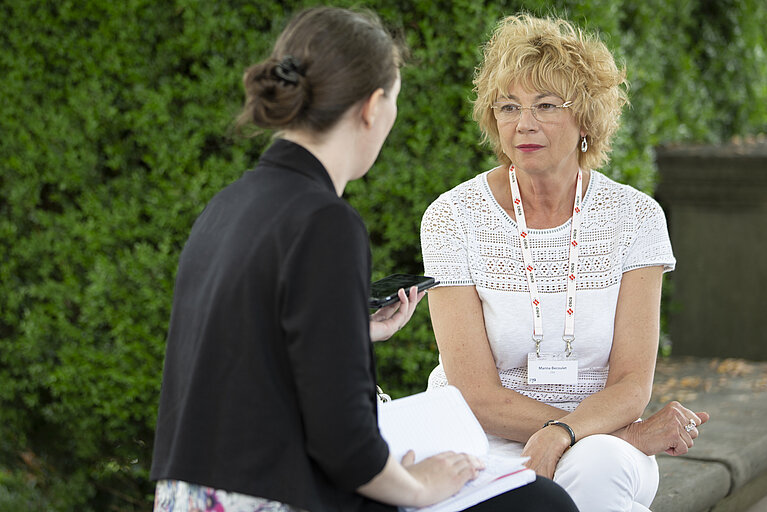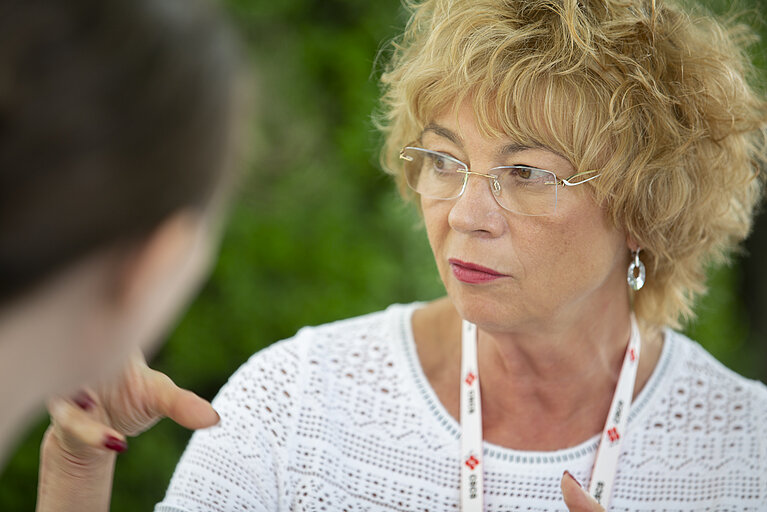July 15, 2019 - by Sarah Waldrip
Becoulet studied plasma physics at Moscow State University and then obtained her PhD in physics and mathematics in 1985 from the Institute of Applied Mathematics at the Russian Academy of Science in Moscow. After working in Moscow for a few years, she relocated to the United Kingdom for a one-year stint working on the Joint European Torus. She then made her way to France in 1993 to work with the Alternative Energies and Atomic Energy Commission, or CEA. She has now resided in France for more than 25 years, serving as a Senior Research Physicist in the Institute of Research in Magnetic Fusion (IRFM) at CEA since 1998. As a Research Director, she specializes in both theory and modelling of magnetic fusion plasmas.
In her newest role as a member of the Partnership for Advanced Computing in Europe’s (PRACE’s) Scientific Steering Committee, Becoulet frequently attends high-performance computing (HPC)-related conferences and international science events. Aside from regularly attending PRACEdays, she delivered a keynote presentation at PASC18 last year, and also delivered a keynote in May of this year during EuroHPC Summit Week, held in Poland. Her extensive professional fusion research experience, much of it working with international teams of scientists, coupled with her long-time relationship to HPC has afforded her a well-informed perspective on the way HPC brings together disparate fields of research that would otherwise have little common ground.
First, can you explain why HPC is so important for your work?
Now, you can’t do anything without HPC. For example, in our case, now we are developing a new, clean source of energy, like based on nuclear fusion and magnetic confinement fusion—now it’s not just academic research anymore. Concerning our ITER machine, it’s a next-step large experimental device where the possibility of fusion energy production will be demonstrated. The following step will be a real power plant, DEMO. The main goal is to maximize fusion power but with total control of plasma. So, you should design plasma scenarios and control tools, which is possible only with full understanding of the physics. But also, once you understand, you should optimize things, and propose new developments. I am very proud of what we have started to do for the new project, like ITER. We developed, for example, edge plasma instabilities control by stochastic magnetic fields first on a theoretical basis, then by computer first-principles modelling. Now there are objects (special coils), and they will be built into a machine; and all the regimes that we discovered in modelling will be tested in ITER. But at the same time, we are doing validation of our code on existing machines. So it’s doing work between technologists, experimentalists, theoreticians, modelers. This is a very practical thing. Without high-performance computing, you can’t do it. You really need it to make progress.
From your perspective, what has been consistent at the PASC conferences over time? What has changed this year?
I really adore this conference. I was a keynote speaker last year, but for me, it was a surprise. When I was invited, I thought, ‘there are so many different subjects, we have nothing in common. What can we do together?’ But I saw that it is really very well done. You have many disciplines, but at the same time, what is common for us is numerical methods and computing. So you really can learn something from the other fields. It’s really synergy, and it works. I represent PRACE here, but I was personally very happy to come this year, to hear the keynotes and everything else, and to feel this spirit, to meet people from different areas, to use their tools and also to see them so open for collaborations. I am very glad that after my minisymposium, the people just went together to the same table for lunch afterward, just discussing and trading their business cards. This is great! I also see more and more countries involved. For instance, this year I was surprised to see how many Chinese scientists are coming, are involved and doing great jobs. It became a truly international conference, and this is really great, this direction that PASC is taking.
What do you find unique about the PASC conference that you don’t experience at other comparable conferences?
PASC is unique. At lots of conferences, if it’s, for instance, for physics, then it’s physics. Or if it’s chemistry, it’s chemistry. And often HPC is viewed like a tool, and nobody really cares about how it works. For example, I am doing computing, but, it’s like, “Baby you can drive my car.” (laughs) It’s like, I don’t know how it works, don’t care, just give me the wheel and we will go. But here at PASC, it’s more like you can put everything at the same level. I mean, all subjects are the same on the matter of how you do it — with numerical methods, computer science, etc. — and people are attracted to this. So, here at PASC you are just talking the same language, more or less, plus you can catch some experience from other fields. Especially for computer science, this has been missing in the past.
What are your thoughts on the minisymposium that you led today, entitled “Numerical Methods and HPC Challenges in Magneto Hydro Dynamics (MHD) Modelling in Plasma Physics”?
I worried a little bit, because I combined people from very different areas. It was more or less the same subject, but there were people working on cold plasma discharges, in nuclear fusion, astrophysics, meaning very different plasma regimes, and trying to find something in common. … And finally, it worked very well, because people found each other, and people found some parallels in interest, the similar methods in computing and now they are talking. That is what I wanted. This subject was underrepresented last year, so I wanted to continue to bring more people from astrophysics, magnetic fusion, and cold plasma.
How does your role at PRACE affect your perspective on this conference and all that is going on here?
When I arrived, it was three years ago in terms of the PRACE Scientific Steering Committee, I was just surprised to see this environment and the infrastructure. Being a scientist, you’re just usually focused on your subject and going to the corresponding conferences. But now, we see many common problems in very different domains. All of us, we experience this difficulty: We have students, for example in physics, but not enough students and not enough careers in computing. And this is a problem everywhere, in every branch. In the Scientific Steering Committee at PRACE, we have representatives from many subjects and many domains, and they all say the same thing. And this is everywhere around the world, I would say. We just don’t have much money in academia, … but we are desperate to have more computing students on board; and how to do it properly is being discussed all the time. Especially now, with the coming EuroHPC joint undertaking, because we need this investment not only in hardware, which is done nicely with millions of euros, but it should be almost the same level of investment in people. There should be structures for this. … It’s still very much like scientists are not the first priority, but rather hardware and vendors are the first priority. It’s getting better, though. We quietly, progressively, diplomatically keep trying, and PASC is helping.
Were there any surprises for you this year that you weren’t expecting?
Yes! There was a structure that I discovered today, it was my dream structure, and it exists already! But it is in China… I want this structure in Europe! (laughs) But now we are in contact, and we will try to do something. Because China is a part of the ITER project, China is already collaborating with us, so maybe we will do something more.
What do you hope to see at future PASC conferences?
More keynotes, even two in the morning and two in the evening. And maybe because this year felt a little bit like a climate conference, I would like to see more diversity. Last year it was gravitational waves all over the place, because it was very fashionable, and it was fun. But I would love to see more quantum mechanics, astrophysics, chemistry, materials science, and really everything. Just more!
Further information
Here you can access the agenda of PASC19 with links to recordings of the plenary presentations >

